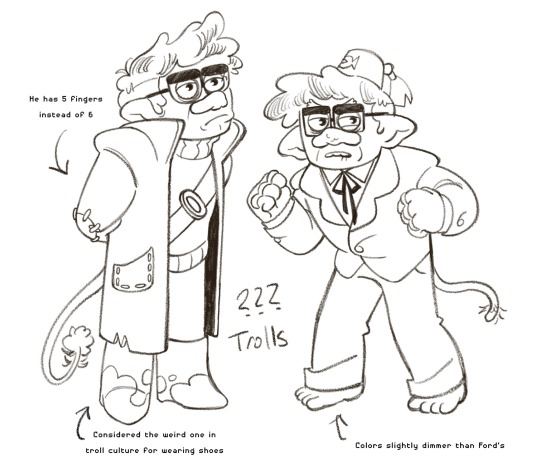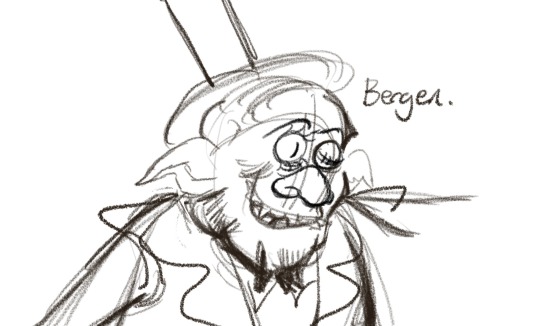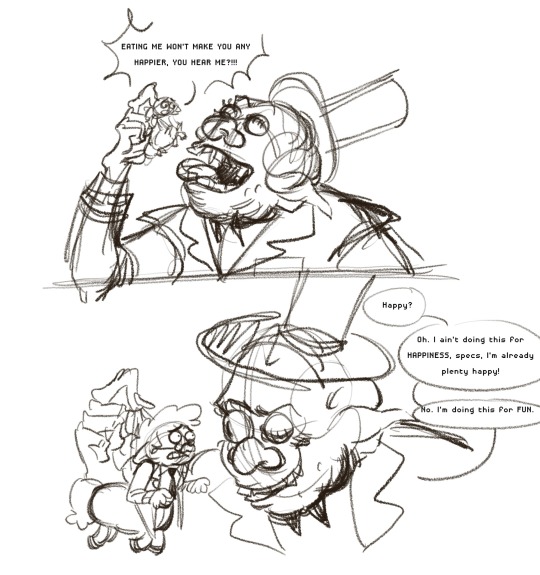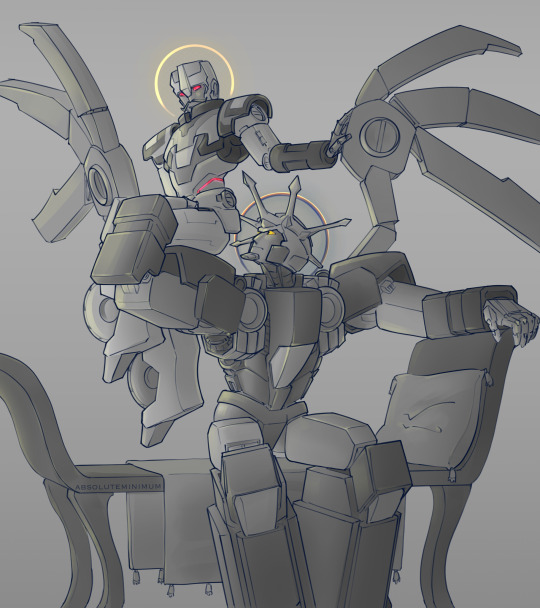#bad lore
Explore tagged Tumblr posts
Text
so... if it's canon that q!bad was one of the angels under the euphrates river — one of the "four avenging angels rise from the river with their weapons, ready to fulfill their mission of killing a third of the people on earth" — and it's also canon that he's now a demon (mind you the angels under the euphrates were already there because they'd sinned and were basically on thin ice with the big man) that would ultimately imply that he fulfilled his mission of killing a third of the population and then got booted from the sky above by god himself. thus, demon.
we know he's (as a demon) responsible (accidentally or not) for:
the black death (possibly)
the destruction of pompeii
the fall of atlantis
he's also canonically "a" grim reaper, although he does this part time... but from last stream we can infer he's very much in tune with life and death still, to the point of it being the only reliable information we have from him right now.
we also know from last stream that the horse he found is... very fitting with the concept of the four horsemen of the apocalypse.
the fourth and final horseman is named death. known as θάνατος (thanatos), of all the riders, he is the only one to whom the text itself explicitly gives a name. unlike the other three, he is not described as carrying a weapon or other object, instead, he is followed by hades (the resting place of the dead). however, illustrations commonly depict him carrying a scythe, sword, or another implement. the color of death's horse is written as khlōros (χλωρός) in the original koine greek, which can mean either green/greenish-yellow or pale/pallid. the color is often translated as "pale", though "ashen", "pale green", and "yellowish green".
now, for this to be a viable theory we have to discard the greek mythology figure of thanatos because in this case thanatos is simply a placeholder for the name "death" so there's no need (as of right now) for us to go down another mythology wormhole.
so, as of november 19th 2023, q!bad is most likely one of the future horsemen of the apocalypse, specifically death... but it's okay because "it's not time yet".
314 notes
·
View notes
Text
The Havameal: a small cookbook, containing 16 secret recipes, composed by Odin while having from the world tree, waiting for the mushrooms to kick in.
0 notes
Text
Summer Times

Hi! I'm finally back from my two week abroad trip!
#i hope everyone is doing well!#ive gotten quite a bit of asks these past two weeks and i apologise for being so silent with art#i didnt bring my laptop with me and didn't have the proper environment to set it up even if i did so i couldn't really draw#i want to properly answer questions and make lore posts with more than just text so i hope you can forgive me#everything is going to be answered in due time#all my art projects are also getting completed and i really hope you'll like them because i think they're pretty cool!#for one instance im learning krita to make a bad end au themed animatic#if im successful i might even get to make an actual short episode one day which would be cool i think#once again thank you for the support despite my abscence#super mario#super mario bros#smb#luigi#mario#princess peach#mareach
3K notes
·
View notes
Text
╭────༺♡༻────╮
YANDERE!PLAYBOY X FEM!READER
Valentine’s day Special! <3
warnings ;; yandere!playboy being a delusional freak (as usual), yandere behavior, MAJOR second hand embarrassment, slightest bit of angst (if you squint), crack.
╰────༺♡༻────╯

Valentine’s Day for Kieran was basically his second birthday. The rich boy never bought candy, why would he, when he could stock up for free just from today alone? His locker was overflowing with chocolates, candies, and love notes—notes that he didn’t even bother reading before tossing them straight into the trash. But the sweets? Oh, he made sure to keep those. Stuffing his bag full, he scoffed at the cheap, store-bought heart chocolates while setting aside the good stuff; the expensive ones, the homemade treats that probably took hours to make. Greedy. That’s all it was. Kieran was just greedy. But even with all the gifts, all the attention, all the adoration, it never really mattered—not until today. Not until he spotted one letter on his desk that actually made his heart skip a beat. Because this one? This one had to be from you. For the first time on February 14th, Kieran felt a genuine rush of excitement, something different from the usual smug satisfaction of being adored that just boosted his already huge ego. The envelope sat on his desk, neat and delicate, like it had been placed there with care—like it actually meant something. His fingers brushed over your initials written in beautiful cursive handwriting, slow and deliberate, his mind already running wild. Finally. You were finally giving in. He could already picture you, shy and flustered as you wrote it, your heart laid bare just for him. A love letter? From you? His sweet little obsession finally coming to her senses? He was grinning, twirling the letter between his fingers, taking his time, savouring the moment. Oh, you were so cute for this.
He carefully opened the letter, fingertips tingling with anticipation. His heart was racing, his mind already running a mile a minute. What kind of sweet words did you leave for him? Were you confessing your love? Finally admitting that you couldn’t resist him any longer? God, you knew him so well! Every detail, down to the paper, the handwriting, the delicate way the envelope was sealed—it all screamed you. This was the first time that the suave playboy turned into a giggling high school girl, biting his lip to keep from grinning too wide. If he was just some regular guy, people would be throwing weird glances at him for nearly stomping his feet in excitement, but he’s Kieran, so no one does.
To be honest, all the girls around him loved it. They giggled amongst themselves, watching him act like a lovesick fool, finding it more endearing than embarrassing. Some of them seething in jealousy at the mysterious girl who got the school's renowned playboy all lovestruck like this. Man, pretty privilege was real. Any other man would’ve been clowned for this, but Kieran? No, Kieran could get away with anything—especially when he looked good doing it.
The white haired male just had to find you, had to catch a glimpse of his princess all shy and flustered from pouring out her emotions in this cute little letter. He was already going to force you into his valentines day plans-- but you, making the move first? Gosh, you never fail to surprise him. Kieran rushed around the school, finally found you hanging around the library. He waltzes over to your table, practically floating with confidence, that stupidly charming smirk plastered across his face. With an easy flick of his wrist, he spun the chair around, plopping down and draping his arms over the back like he owned the fucking place; the letter was in his hand, obnoxiously tapping it against his palm as he leaned in, way too close, eyes glinting with something dangerous beneath all that excitement.
“Sooo...” he drawled, looking at you up and down, voice smooth as ever, “...couldn’t resist me anymore, huh princess~?” the blue eyed male winked as he laughed boyishly, Though his words were condescendingly annoying, a glint of affection is laced in his orbs.
You, the girl who just wanted some peace on this already lame ass day where you enviously stare at the lovey dovey highschoolers with, gaze up from your notebook as you stare blankly at him, forcing yourself not to immediately roll your eyes at the sight of the blue eyed playboy. “Huh?” You blink once, and then twice at him.
Kieran scoffs out a laugh. Still so shy, bless your cute little soul. “The letter, sweetheart.” He waved it a little, like it was obvious. “Real cute of you, by the way. You always did have good taste.” Your eyebrows furrow as you stare at the pastel pink letter, squinting at it before looking back at him. “What letter? Dude what the fuck are you talking about?” tilting your head as you grimace at his stupid little smirk. Kieran let out a breathy laugh, tilting his head like you just said the funniest thing in the world. “Ahh, playing shy now? That’s adorable, really,” he mused, tapping the letter against his chin. “Didn’t think you’d get cold feet after pouring your heart out like this, but it’s okay, princess. I get itttt. Big emotions can be scary!” he says with a mocking pout, leaning in closer. He reached out, trailing a finger down your arm like he was so sure this was some flirty little game. Youre playing hard to get as always, its okay! He likes the chase. However, you cant back out this easily when he literally has the physical proof of your love-- no, infatuation towards him. “You don’t have to pretend, y’know. I already know it’s from you.” his other hand tracing the first letters of your first and last name that was engraved onto the envelope.
But the way you just kept staring at him, utterly lost, was starting to poke holes in his fantasy. No. No, you were just messing with him. Testing him. Right? Rolling your eyes, you snatch the letter out of his hand, too tired to deal with whatever weird fantasy he had cooked up this time. With an exhausted sigh, you scanned the handwriting, flipping the letter over to really stare at the initials , and then—oh. Oh, this was actually hilarious. Your hand slaps your mouth as you stifle a giggle.
“Kieran,” you deadpanned, looking him dead in the eyes, “this isn’t from me. It’s from the other girl in our chemistry class. Y’know, the one with the same initials as me?” Silence.
Kieran just stood there, blinking, like his brain was trying to reboot. His fingers twitched slightly at his sides, and for the first time all day, he didn’t have a slick response ready. You watched, unimpressed, as his expression went through about ten different emotions at once—confusion, disbelief, denial, a little more denial—before finally landing on something unreadable. “...what?” He freezes for a solid minute before letting out a light chuckle, rolling his shoulders back like this was no big deal. “Ohh, right. Of course. The other girl.” He nodded, slipping his hands into his pockets, throwing on that easy, practiced smirk. “I knew that! I was just.. I was just joking, silly~!”
But inside? He was tweaking.
'What the actual hell. What do you mean it’s not from you? Then why the hell did it feel like you? Look like it was from you? Sound like you?' His heart was racing, but not in the good way anymore. His palms felt weirdly clammy. His eye twitched. 'No. No, no, no. This doesn’t make sense. This was supposed to be from you. This was supposed to be our moment. So why— who, who even is the other girl??? Has he ever even interacted with her??' Suddenly the heartfelt words that adorned the letter just seemed incredibly corny and cheesy to him. The bright pastel colours decorated along the paper blazed in his eyes, practically laughing at the delusional boy that stood before it.
You crossed your arms, raising an eyebrow at him. “Uh-huh. Sure you did.” Kieran swallowed. Act natural. Act. Natural. The playboy opened his mouth, ready to spit out some smooth, damage-control comeback—but nothing came out. For the first time in his entire life, he had nothing. Just sitting there, frozen, swallowing the most brutal, humiliating reality check of his existence. And the worst part? You were just staring at him. Not even amused. Not even mad. Just tired and annoyed.
“Oh my God,” you muttered, pinching the bridge of your nose like you were physically in pain just being near him. “I literally don’t have time for this. Happy Valentine's Day man.” You say with a tight lipped smile, grabbing your stuff as you pat his shoulder. And with that, you turned on your heel and walked away.
Kieran just stood there, gripping the letter so hard it crumpled in his palm. His ears were burning, his jaw tight, but his smirk? Still there. Bruised ego? Maybe. But shattered? Please. A mix-up like this wasn’t enough to shake him. You didn't straight up reject him, it was just a misunderstanding! It was all that stupid girl's fault for having the same initials as his dear soulmate! As if you could ever actually reject him.
No, no, this just meant you were still fighting it. Still playing your little games, still too stubborn to admit what you really wanted. Him. That was fine. He had all the time in the world to let you come to your senses. You’d see it eventually—how you were meant for him, how there was never any other option. And when you finally stop running? Oh, princess he’d be right there, waiting. Besides, there was always next year, and that time; he is certain that the only chocolates he’d be getting is from you.

a/n :: for some reason you guys looveee seeing kieran suffer so heres my early valentines gift for you all :p (maybe not you all but the three anons in my inbox LOL) purerae<3
#i feel bad for the random girl who just wanted to confess her love LOL#happy early valetines day guys!! ily all <3#purerae#yandere blog#male yandere#yandere headcanons#male yandere oc#yandere#yandere oc#yandere oc x reader#yandere x reader#yandere playboy#yandere playboy x reader#playboy x reader#playboy lore#yandere x you#yandere imagines#yandere oneshots#yandere scenarios#yandere x darling#yandere x female reader#yandere oneshot#yandere hcs#yandere x y/n#yandere male#yandere fanficton#yandere valentines day#valentines day special#male yandere x reader#yandere writing
1K notes
·
View notes
Text


Carry me home
#final fantasy xiv#ffxiv#final fantasy 14#ff14#haurchefant greystone#haurchefant x wol#haurchewol#ffxiv wol#ffxiv spoilers#heavensward spoilers#final fantasy xiv spoilers#tinydraws#Rowan Morte#let me know if i’m missing any spoiler tags#tagging seems like it would be an easy and straightforward thing but also. i’m stupid.#anyway i choose to believe that Rowan carried him back to the manor#even if someone tells me otherwise i will not believe them#also i choose to believe that these two had it bad for each other#neither of them said anything but everyone could tell lol#haurche specifically was very Not Subtle in his displays of affection#and Rowan for the most part picked up on it#not everything cuz she's still in the midst of working on accepting any amount of companionship. but like. most.#and went ‘honestly.... if i told him i liked him it would probably go well. We just have so much stuff to deal with; now’s not a good time'#and then the time came and went :’)#and Rowan went ‘Did….. did he know? Did he Know how much I loved him? did he KNOW???????’#and then she grieved behind closed doors away from everyone#and also tried to replace said grief by focusing a lil too hard on her duties#idk i’m still working out WOL lore but this is what i got so far lol#or at least in regards to haurche
2K notes
·
View notes
Text













Post-canon, somewhere in a Rivaini inn, Lucanis sees more of "Rook" than he thought possible <3
Background/headcanons under the cut for context:
Background:
- Lydia Laidir, born into slavery in the Imperium, was inadvertently freed when the ship she was serving on was attacked by the Felicisma Armada, and eventually taken in by Isabela and the Lords of Fortune. Isabela gave her the affectionate nickname "Rook(ie)", and in a effort to cope with her upbringing she sought to reinvent herself under this new name. Overtime, the name Lydia became an extremely personal aspect to her, and by the time of Veilguard the only people who know her real name are Isabela and Anders (her magical mentor), and she goes by Rook exclusively to everyone else, even her partner Lucanis.
Headcanons:
- After the events of Veilguard, Spite stops reflecting Lucanis and instead takes the form of a cat (credit for this galaxy brained hc goes to @/ravioliage)
- As a mage growing up in Rivain and mentored by Anders and Justice, Lydia has learned to hear Spite in a similar way to Emmrich 💜 This makes many situations both more and less awkward.
- Shortly after the events of Veilguard, Lydia was able to pair Lucanis with a baby wyvern of his own, who he named Dolce (credit for the name goes to @/iisadiya), and when there isn't a pen outside or there's bad weather, she curls up on whatever furniture the inn provides in their room and absolutely destroys it with her claws and venom <3 Lydia and Lucanis have, on multiple occasions, had to soothe a very distressed innkeeper and pay a small fortune in damages 😔
#datv#dragon age#veilguard#rookanis#lucanis dellamorte#tumblr formatting my belaothed#ouooohhhh i nearly ran out of steam i'm so glad i got this finished#the vague idea of “lydia's name would sound hot in lucanis's accent and she'd be Into That” has been rattling around in my head for a while#(something something “being truly seen for the first time in a while by someone you love”)#so this was mainly an endeavor in finding the connective tissue#i included the bg/hc because i am updating lydia's lore (a lot of what i said here does contradict what I've mentioned foe her before)#also just in case for any of my trans followers: spite is not dead-naming lydia here or anything bc that is her name#it's just only her name To Her y'know? but i wanted to clarify bc i know this might not hit the same for every audience ^^;;;#also i feel like i need to factor Spite into their relationship more often. bc he is There but it's not necessarily a bad thing#my art#sun-marie art#artists on tumblr#digital artist#fanart#fan art#lemon#rook#rook laidir#lord of fortune rook#oc: lydia laidir
982 notes
·
View notes
Text

Dear Canary, since you asked so nicley, we can make a exeption just for you
#art#wildlife#wild life spoilers#wild life smp#wild life fanart#wild life series#trafficblr#life series smp#traffic smp#life smp#wild life jimmy#canary curse#jimmy solidarity#solidaritygaming#traffic light smp#mcyt#life series fanart#the watchers#watcher lore#it got so bad it turned into religion#artists on tumblr#digital artist#small artist#digital art#solidarity gaming#jimmy solidaryty fanart#watchers fanart#i am so happy that Jimmy is not out first
2K notes
·
View notes
Text
Putting the Gravity Falls characters into the Trolls universe just because I can






#I have NO IDEA what kind of Troll to make Stan and Ford ngl#I do think it would be funny if the only reason Stan doesn’t sing is because he just has a bad singing voice#I’m still juggling with Bill’s concept tho because everything sounds so interesting for him#he could be a Bergen or a Mount Radeon or something else entirely- maybe even just some regular ass troll#anywho- this was mostly for the funsies and the fucksies so there is no lore whatsoever#my art#gravity falls#gravity falls au#crossover#dreamworks trolls#trolls fanart#trolls movie#trolls au#trolls#JEEZ that’s a lot of tags#stanley pines#stan pines#stanford pines#ford pines#dipper pines#mabel pines#bill cipher#fiddleford hadron mcgucket#fiddleford mcgucket#you can witness my art getting progressively lazier
1K notes
·
View notes
Text
Wrestling lore is really funny to explain to non-wrestling people, mainly because you have to suspend your disbelief much more than you would do for stuff like anime or superhero fiction. Think of it like this; it’s normal for a shonen anime protagonist or a superhero to demonstrate they have superpowers usually because it’s established early on. That also goes for other parts of the lore, such as the world-building, the MacGuffins, and the history of that world.
But in wrestling, characters and storylines change all the time and are ongoing (I’ve seen the term “longform storytelling” used). So you end up with HUGE leaps in logic, such as:
1) There’s a supernatural being from hell who temporarily became a biker gang member, and then went back to being a supernatural being from hell
2) There’s a male model who gave out grooming tips who eventually evolved into Captain America/Homelander.
3) Triple H committed burglary on camera. He invaded Randy Orton’s home, beat him up, destroyed some of his property, and then threw Orton out the window. But it’s all fine because he’s the good guy, so he’s still employed by the WWE.
4) Dominik Mysterio is beefing with his dad, who literally fought for child custody of him in a wrestling match. Keep that in mind anytime you see Dominik not getting along with Rey.
5) Edge got sent to hell, but is okay now.
6) CM Punk was once a cult leader, but stopped doing that after he lost his hair. Then he became the opposite, as in he turned into an anti-authority rebel.
7) A lot of wrestlers, such as Sheamus and Shawn Spears, apparently used to work at WWE as background staff/security guards.
8) Real life famous music artist Bad Bunny is part of the lore and he actually beat a world champion (Damian Priest) in a match. And I don’t mean Bad Bunny is playing a character. In the WWE lore, Bad Bunny is playing himself.
(Feel free to add on any other leaps in logic from pro-wrestling)
#WWE#lore dump#lore#WWE lore#world wrestling entertainment#world wrestling federation#professional wrestling#pro wrestling#wrestling#the undertaker#undertaker#cody rhodes#dashing cody rhodes#triple h#randy orton#hunter hearst helmsley#rko#dominik mysterio#rey mysterio#adam copeland#wwe edge#cm punk#sheamus#shawn spears#bad bunny#damian priest#wwe wrestling#wwe monday night raw#wwe smackdown#wrestler
1K notes
·
View notes
Text
I was in a food court in Japan today and I had to do a double take when I saw this

1K notes
·
View notes
Text

The artificial infantry have become eccentric with age, it seems. Some of the support walkers appear to take great joy in wielding arms with their forward manipulators — much like their human peers — and refuse modification, despite mounted guns being much more effective weapons…
1K notes
·
View notes
Text

#badboyhalo#badboyhalo fanart#the realm fanart#the realm smp#the realm badboyhalo#bbh art#trsmp bbh#bbh lore#bad got an extra pair of angel wings with nirvana headcanon
1K notes
·
View notes
Text
cant stop thinking about the guy who came up to me at the comic festival this weekend, looked through my dungeon meshi stuff, then when he didnt recognize the winged lion told me he stopped reading because the world building wasn't solid enough.
The world building wasn't solid enough. In dungeon meshi.
#i get that before the winged lion is introduced its not actually that lore heavy but. Then maybe dont say the world building is bad#when you today can see that you didnt read halfway through#the comic that has since become known to have some of the most nuanced and solid world building of its time#then he tried to give me the wikipedia of a swedish like culture preserver#not knowing i worked as a guide in an out door museum for swedish culture in the 1800s#and that i am incredibly nerdy about folklore and most of the time know not only the general idea#but has looked through first hand recounts preserved in a national archive marked with who when and where#anyway dungeon meshi too thin worldbuilding take is INSANE#also dont go up to someone who is clearly a fan and start dissing on the thing#1. its rude and 2. literally what are you expecting??? They WILL not agree????#antrant#this goes on main
927 notes
·
View notes
Text
guess who just got exposed to WHOOPING COUGH!!!!!!! *jazz hands*
#I'm so angry#they told the guy that he had a really bad post-nasal drip#and that he wasn't contagious#and then sent him test results IN THE MAIL#I was sitting next to him for about half an hour last night while he convulsed because I was legitimately afraid#that he was going to keel over#or have a heart attack#i have never heard a person make the noises he was making#cannot express in mere words how much I do not want to go through what he was#unfortunately that means I was extremely exposed#anyway get your fucking vaccines jesus FUCKING christ#op#lore drop
761 notes
·
View notes
Text

i need to study this man in a lab
#hundred line#hundred line last defense academy#eito aotsuki#LDA#my art#my views of this guy went from fave->I HATE THIS GUY SO BAD->??? idk what i feel->I guess hes my fave again??#Anyway i was mostly trying to remember how to draw idk if ill do any more fanart of this game#bro this guy has so many aspects in his design i dont normally draw#glasses + forehead + pale color palette how am i supposed to work with this#is there a lore reason for why everyone is quite literally gray#anyway crumpling this guy up like a wad of paper and chucking it into the wall#for a game i consider a 7.5 and dont feel like im brainrotting over i sure have a lot of thoughts about it both positive and negative
483 notes
·
View notes
Text

The Chief Justice Tyrest and his most faithful attendant, Minimus Ambus
#made up some Greek myth style lore for this one#I wanna write more toxic unhealthy Minimus/Tyrest so bad#I think I've finally leveled up my art guys this looks like Real Shading???#tried to colorize it but it looked shit so we stay greyscale (ignore the 6 hours I wasted trying colors)#maccadam#transformers#my art#transformers idw#minimus ambus#idw transformers#tyrest#mtmte#minimus ambus/tyrest
406 notes
·
View notes